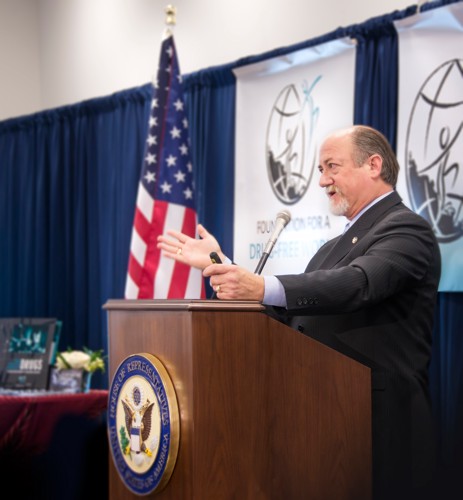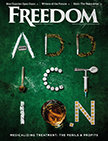
What is the key to your approach to the drug problem?
You’ve got drug-supply reduction and drug-demand reduction. We do drug-demand reduction. If you can stop drug use before it starts, over time you will have less use, because fewer kids use drugs.
How exactly do you go about reducing demand?
Our first strategy is information dissemination—distributing materials that educate and raise awareness of what drugs are really about. The second strategy involves education and training—of parents or police or public officials. The third is coalition development, building a group of people to take action, to do something. Then you have alternative activities and early intervention. In other words, you reach kids who have experimented with drugs but aren’t yet addicted. You intervene early to keep them from being addicted.
How important is education in keeping young people off drugs?
Let’s say 20 percent of the kids are using drugs now. Five years from now, if kids stay off drugs, it will be only 10 percent of the kids using drugs. When they become adults, there will be half the number of drug users, so we have to deal with drug prevention. That includes access to effective drug education programs. We partner with the Church of Scientology and Foundation for a Drug-Free World. Their Truth About Drugs program has some of the most effective educational materials I have seen. To Scientology, it’s a drug-free world, not a drug-almost-free world. It’s that vision, that high level of attainment that is so important to me and so important to the world.
How can individuals address drug abuse in their communities?
One of the most effective ways is to build coalitions that establish local policy and work together to make effective drug education programs available. Those communities with drug prevention coalitions have been found to have a much lower drug-use rate than those that do not. To anyone who wants to see change, I say get involved. Get active and form a group. Your collective voice is louder than that of any one individual. Get information, get some training, and use programs like Truth About Drugs to provide effective drug education. Mobilize the community for positive change.
What is or what should be the role of law enforcement?
We have done a lot of work with law enforcement on how they deal with prevention. Part of this is encouraging the police to look at drug policy not only from the enforcement and criminal perspectives, but also from the health and human rights perspectives. If a policy increases drug use, it is simply bad policy. Any policy that is going to be instituted must put young people first—they must be the priority.
What goal do you envision accomplishing with drug education?
To effectively educate young people so they make the determination for themselves to stay away from drugs. Children have the right to grow up in a drug-free environment, and we need to take the necessary actions to achieve that.































